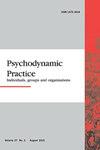当代心理动力学监督中的种族与文化
IF 0.4
Q4 PSYCHOLOGY, CLINICAL
引用次数: 0
摘要
在过去的二十年中,在临床监督中对种族和文化的理解有了显著的进步。然而,对当代社会文化背景对被管理者和监督者生活的影响的关注仍然较少。这篇手稿探讨了种族和文化是如何在持续的社会文化创伤和不公正的监督中经历的。特别地,我强调了精神分析监督的关键特征最近是如何扩展到包括对社会文化动态的关注,然后研究当代社会政治背景如何对被监管者和监督者的生活产生具体影响。我还强调了将少数种族监督者和监督者的经验作为中心的重要性,这些经验在有关心理动力学临床监督的学术研究中仍然不太明显。为了扩展先前关于监督中种族和文化动态的理论,我建议进一步关注心理动力学监督中的以下领域:1)无意识关系过程(如移情,反移情和平行过程)的作用;2)外部现实的影响;3)脆弱和谦逊的作用。该手稿呼吁在心理动力学监督中整合种族和文化的集体使命。本文章由计算机程序翻译,如有差异,请以英文原文为准。
Race and culture in contemporary psychodynamic supervision
Over the past two decades, there have been significant strides towards an improved understanding of race and culture in clinical supervision. Yet, there continues to be less attention directed towards the influence of the contemporary sociocultural context on the lives of supervisees and supervisors. This manuscript explores how race and culture are experienced in supervision amidst ongoing sociocultural traumas and injustice. In particular, I highlight how the key features of psychoanalytic supervision have recently been expanded to include attention to sociocultural dynamics, and then examine how the contemporary sociopolitical context has specific impacts on the lives of supervisees and supervisors. I also underscore the importance of centring the experiences of racial minority supervisees and supervisors, which have remained less visible within scholarship concerning psychodynamic clinical supervision. In an effort to expand prior theorising on racial and cultural dynamics in supervision , I propose further attention to the following areas in psychodynamic supervision: 1) role of unconscious relational processes (e.g. transference, countertransference, and parallel process); 2) the influence of external realities; and 3) the role of vulnerability and humility. The manuscript is a call for a collective mission to integrate race and culture in psychodynamic supervision.
求助全文
通过发布文献求助,成功后即可免费获取论文全文。
去求助
来源期刊

Psychodynamic Practice
PSYCHOLOGY, PSYCHOANALYSIS-
CiteScore
0.90
自引率
0.00%
发文量
41
期刊介绍:
Psychodynamic Practice is a journal of counselling, psychotherapy and consultancy and it is written for professionals in all fields who use psychodynamic thinking in their work. The journal explores the relevance of psychodynamic ideas to different occupational settings. It emphasizes setting and application as well as theory and technique and focuses on four broad areas: •Clinical practice •The understanding of group and organisational processes •The use of psychodynamic ideas and methods in different occupational settings (for example, education and training, health care, social work, pastoral care, management and consultancy) •The understanding of social, political and cultural issues
 求助内容:
求助内容: 应助结果提醒方式:
应助结果提醒方式:


